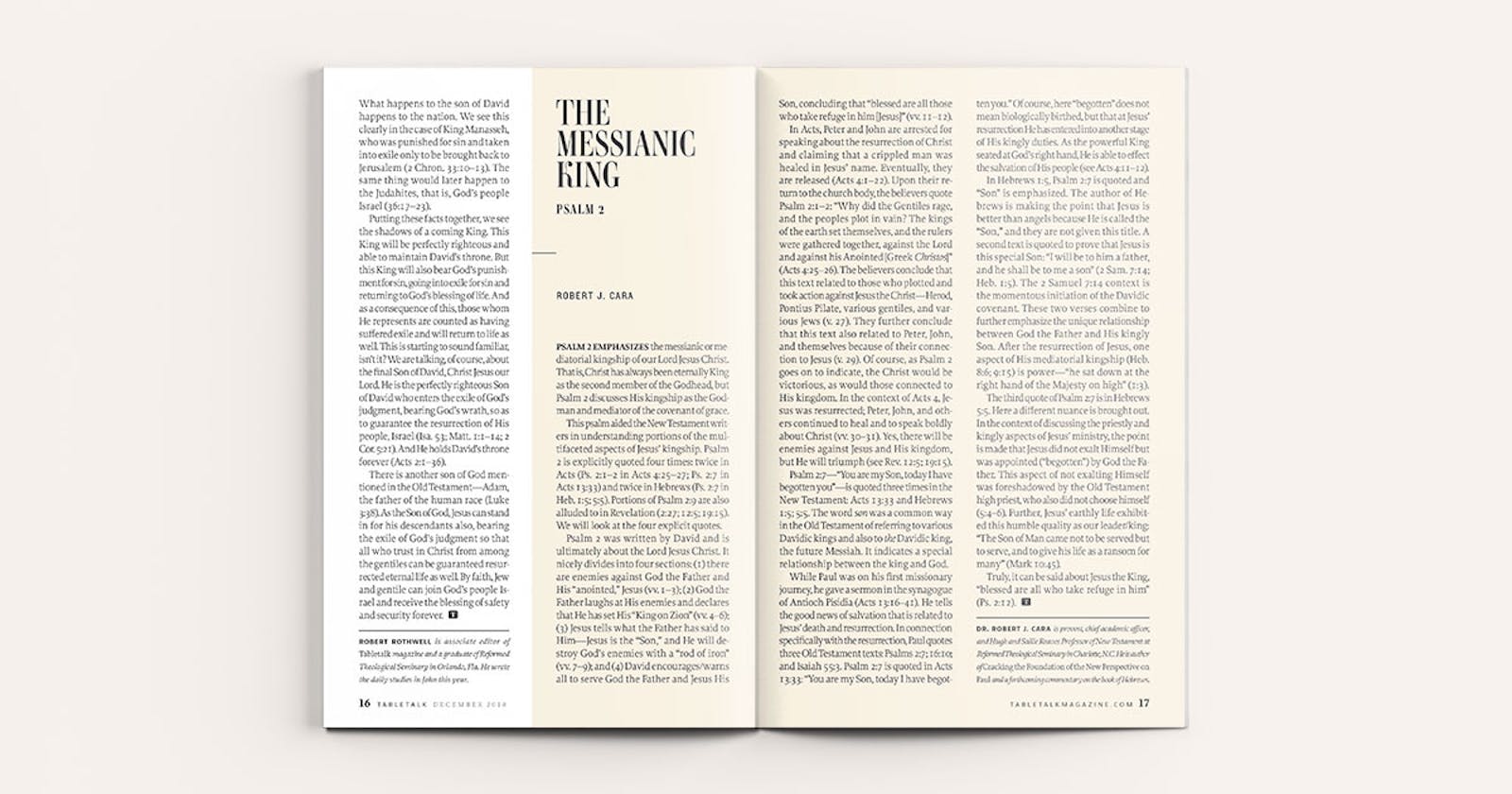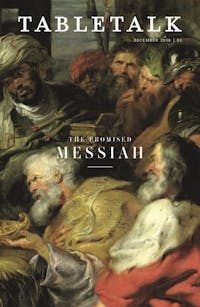
Request your free, three-month trial to Tabletalk magazine. You’ll receive the print issue monthly and gain immediate digital access to decades of archives. This trial is risk-free. No credit card required.
Try Tabletalk NowAlready receive Tabletalk magazine every month?
Verify your email address to gain unlimited access.
Psalm 2 emphasizes the messianic or mediatorial kingship of our Lord Jesus Christ. That is, Christ has always been eternally King as the second member of the Godhead, but Psalm 2 discusses His kingship as the God-man and mediator of the covenant of grace.
This psalm aided the New Testament writers in understanding portions of the multifaceted aspects of Jesus’ kingship. Psalm 2 is explicitly quoted four times: twice in Acts (Ps. 2:1–2 in Acts 4:25–27; Ps. 2:7 in Acts 13:33) and twice in Hebrews (Ps. 2:7 in Heb. 1:5; 5:5). Portions of Psalm 2:9 are also alluded to in Revelation (2:27; 12:5; 19:15). We will look at the four explicit quotes.
Psalm 2 was written by David and is ultimately about the Lord Jesus Christ. It nicely divides into four sections: (1) there are enemies against God the Father and His “anointed,” Jesus (vv. 1–3); (2) God the Father laughs at His enemies and declares that He has set His “King on Zion” (vv. 4–6); (3) Jesus tells what the Father has said to Him—Jesus is the “Son,” and He will destroy God’s enemies with a “rod of iron” (vv. 7–9); and (4) David encourages/warns all to serve God the Father and Jesus His Son, concluding that “blessed are all those who take refuge in him [Jesus]” (vv. 11–12).
In Acts, Peter and John are arrested for speaking about the resurrection of Christ and claiming that a crippled man was healed in Jesus’ name. Eventually, they are released (Acts 4:1–22). Upon their return to the church body, the believers quote Psalm 2:1–2: “Why did the Gentiles rage, and the peoples plot in vain? The kings of the earth set themselves, and the rulers were gathered together, against the Lord and against his Anointed [Greek Christos]” (Acts 4:25–26). The believers conclude that this text related to those who plotted and took action against Jesus the Christ—Herod, Pontius Pilate, various gentiles, and various Jews (v. 27). They further conclude that this text also related to Peter, John, and themselves because of their connection to Jesus (v. 29). Of course, as Psalm 2 goes on to indicate, the Christ would be victorious, as would those connected to His kingdom. In the context of Acts 4, Jesus was resurrected; Peter, John, and others continued to heal and to speak boldly about Christ (vv. 30–31). Yes, there will be enemies against Jesus and His kingdom, but He will triumph (see Rev. 12:5; 19:15).
Psalm 2:7—“You are my Son, today I have begotten you”—is quoted three times in the New Testament: Acts 13:33 and Hebrews 1:5; 5:5. The word son was a common way in the Old Testament of referring to various Davidic kings and also to the Davidic king, the future Messiah. It indicates a special relationship between the king and God.
While Paul was on his first missionary journey, he gave a sermon in the synagogue of Antioch Pisidia (Acts 13:16–41). He tells the good news of salvation that is related to Jesus’ death and resurrection. In connection specifically with the resurrection, Paul quotes three Old Testament texts: Psalms 2:7; 16:10; and Isaiah 55:3. Psalm 2:7 is quoted in Acts 13:33: “You are my Son, today I have begotten you.” Of course, here “begotten” does not mean biologically birthed, but that at Jesus’ resurrection He has entered into another stage of His kingly duties. As the powerful King seated at God’s right hand, He is able to effect the salvation of His people (see Acts 4:11–12).

In Hebrews 1:5, Psalm 2:7 is quoted and “Son” is emphasized. The author of Hebrews is making the point that Jesus is better than angels because He is called the “Son,” and they are not given this title. A second text is quoted to prove that Jesus is this special Son: “I will be to him a father, and he shall be to me a son” (2 Sam. 7:14; Heb. 1:5). The 2 Samuel 7:14 context is the momentous initiation of the Davidic covenant. These two verses combine to further emphasize the unique relationship between God the Father and His kingly Son. After the resurrection of Jesus, one aspect of His mediatorial kingship (Heb. 8:6; 9:15) is power—“he sat down at the right hand of the Majesty on high” (1:3).
The third quote of Psalm 2:7 is in Hebrews 5:5. Here a different nuance is brought out. In the context of discussing the priestly and kingly aspects of Jesus’ ministry, the point is made that Jesus did not exalt Himself but was appointed (“begotten”) by God the Father. This aspect of not exalting Himself was foreshadowed by the Old Testament high priest, who also did not choose himself (5:4–6). Further, Jesus’ earthly life exhibited this humble quality as our leader/king: “The Son of Man came not to be served but to serve, and to give his life as a ransom for many” (Mark 10:45).
Truly, it can be said about Jesus the King, “blessed are all who take refuge in him” (Ps. 2:12).
